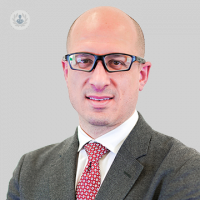What is an apicoectomy?
Autore:Tooth pain is difficult to live with, and can significantly affect our wellbeing if it’s a regular occurrence. Tooth pain is generally caused by an infection or irritation in the nerve in the root of the tooth, and it’s important to get this checked and treated before extraction becomes the only option. A root canal is often the first port of call to save a tooth, but what happens when even this doesn’t work? Leading endodontist and expert in dental pain Dr Federico Foschi explains what an apicoectomy is, and when it’s used to help save your tooth.

What is an apicoectomy?
An apicoectomy is a surgical procedure carried out under local anaesthesia on an infected tooth. Literally, apicoectomy means the removal of the apex of the tooth (where the roots of the tooth come together). In an apicoectomy, the root tip is sectioned under magnification with a microscope in order to address a persisting infection and save the tooth.
Is an apicoectomy the same as a re-root canal?
A re-root canal is a procedure which is carried out when the initial root canal treatment has been unsuccessful, or in the case of recurring infection in the tooth. Re-treatment may be necessary if decay accumulates in the affected tooth, there is a new infection, or if the tooth later cracks or becomes loose.
An apicoectomy is different from a re-root canal, as it is a procedure which removes the apex of the tooth, rather than the root canal procedure which cleans out infected pulp and fills in the root canals afterwards in order to restore the tooth. An apicoectomy is more complex in nature than a root canal procedure.
When would I need an apicoectomy?
An apicoectomy is a surgical procedure that can be carried out when the first attempt of root canal treatment or re-root canal treatment has failed. An apicoectomy can remove the persisting infection directly by removing the apex of the tooth itself, as bacteria can remain within the lateral canal or other areas which are simply not able to be cleaned efficiently through a normal endodontic procedure.
How is an apicoectomy carried out?
The first stage of apicoectomy is actually a consultation: meeting the patient in a non-operative setting. As endodontists, we have to learn exactly what the individual patient needs and tailor the treatment and suggested course of action in order to save the tooth.
After the initial consultation, a 3D CBCT scan (an X-ray that gives a full picture of the tooth) is carried out so the endodontist can visualise the tooth and assess its anatomy.
On the day of the procedure, a local anaesthetic will be administered, which means you’ll be comfortable throughout and won’t feel any pain. Then, a small incision in the gum is made, which will allow us to localise the area of infection, remove the cystic tissue and then address and fill the root tip with a special biocompatible material.
Does an apicoectomy hurt?
The procedure is pain free and done under anaesthesia, so you shouldn’t feel any pain. The procedure is very straightforward and is routine in an endodontic practice. After the procedure, you may experience some pain and swelling, and in some cases, bruising around the area. If you’re in pain, you can take over-the-counter painkillers to combat this.
Is there any specific aftercare?
After the procedure, you’ll need to eat softer foods and avoid anything which is particularly chewy or crunchy. Brush your teeth carefully as you will have to avoid the area until stitches are removed or fall out on their own. A follow-up appointment will be arranged, generally a week later, to check your progress and to see if the healing is well underway.
A year or so later, a final X-ray will be carried out to check how the bone has healed and if the procedure was successful. Apicoectomy has a high success rate, in the region of 80-95%, so it tends to be a one-off, straightforward procedure with positive outcomes for the patient.
If you’ve previously had a root canal treatment or re-treatment and are experiencing pain or infection in the area, visit an endodontist such as the specialists at Endocare clinic in order to be assessed by a qualified, experienced specialist.


